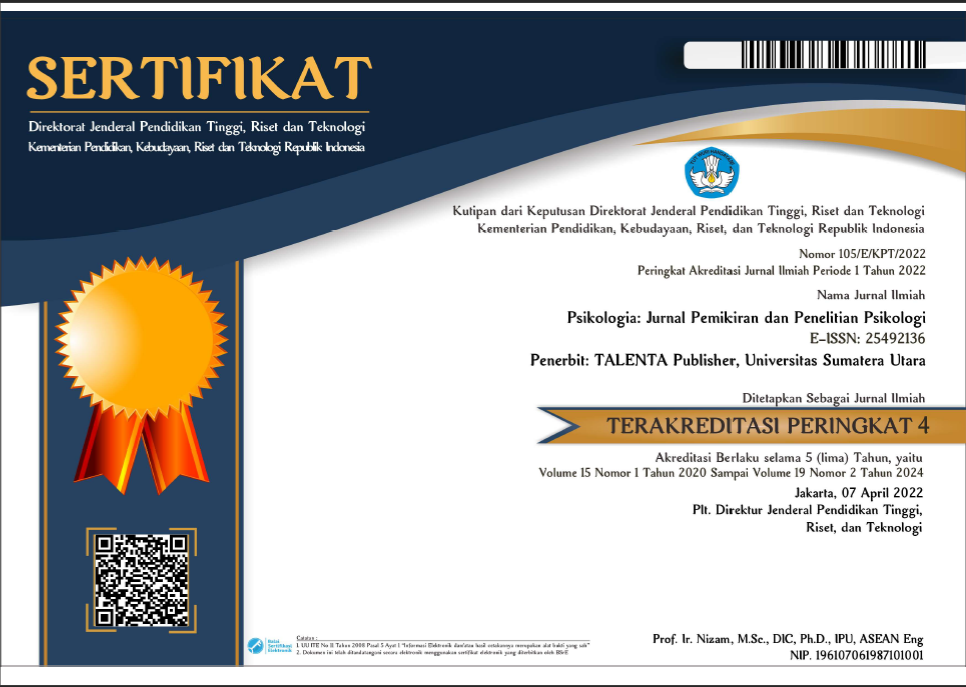The roles of self-control on prosocial and aggressive driving style
Hubungan kontrol diri dengan gaya berkendara prososial dan agresif
DOI:
https://doi.org/10.32734/psikologia.v16i1.7256Keywords:
kontrol diri, gaya berkendara prososial, gaya berkendara agresif, self-control, prosocial driving style, aggressive driving styleAbstract
This study examines the relationship between self-control with prosocial driving style and aggressive driving style. This correlational study (N = 659) showed that high self-control correlated positively with prosocial driving style and inversely related with aggressive driving style. These results suggest that it is possible to mitigate traffic accidents caused by aggressive drivers by increasing their ability to control themselves while driving.
Penelitian ini mengkaji hubungan antara pengendalian diri dengan gaya mengemudi prososial dan gaya mengemudi agresif. Studi korelasional ini (N = 659) menunjukkan bahwa pengendalian diri yang tinggi berkorelasi positif dengan gaya mengemudi prososial dan berbanding terbalik dengan gaya mengemudi agresif. Hasil ini menunjukkan bahwa adalah mungkin untuk mengurangi kecelakaan lalu lintas yang disebabkan oleh pengemudi agresif dengan meningkatkan kemampuan mereka untuk mengendalikan diri saat mengemudi.
Downloads
References
Adlya, S. I., Yusuf, A. M., Effendi, Z. M. (2020). The contribution of self control to students' dicipline. Journal of Counseling and Educational Technology. 3, 1-5.
BPS. (2018). Statistik transportasi darat. Badan Pusat Statistik Kota Medan: Medan
BPS. (2019). Kota Medan dalam angka. Badan Pusat Statistik Indonesia:Jakarta
Calhoun, J. F., Acocella, J. R. (1990). Psychology of adjustment and human relationship. McGraw-Hill Inc: New York
Denson, T. F., Dewall, C. N., Finkel, E. J. (2012). Self-control and aggression. Current directions in psychological science, 21, 20-25.
Ford, J. A., Blumenstein, L. (2013). Self-control and substance use among college students. Journal of Drug Issues. 43, 56-68
Foster, D. W., Young, C. M., Barnighausen, T. W. (2014). Self-control as a moderator of the relationship between drinking identity and alcohol use. Informa healthcare, 49, 1340-1348
Gottfredson, M. R., Travis, H. (1990). A general theory of crime. Stanford, CA: Stanford University Press.
Harris et al., (2014). The prosocial and aggressive driving inventory (PADI): A self-report measure of safe and unsafe driving behaviors. Accident analysis & prevention, 72, 1-8.
Porter, B. (2011). Handbook of traffic psychology. First Edition. New York: Academic Press.
Tangney, J. P., Baumeister, R. F., Boone, A. L. (2004). High self-control predicts good adjustment, less pathology, better grades, and interpersonal success. Journal of Personality, 72, 271–324. https://doi.org/10.1111/j.0022-3506.2004.00263.x
Published
How to Cite
Issue
Section
License
Copyright (c) 2021 Psikologia: Jurnal Pemikiran dan Penelitian Psikologi

This work is licensed under a Creative Commons Attribution-ShareAlike 4.0 International License.








